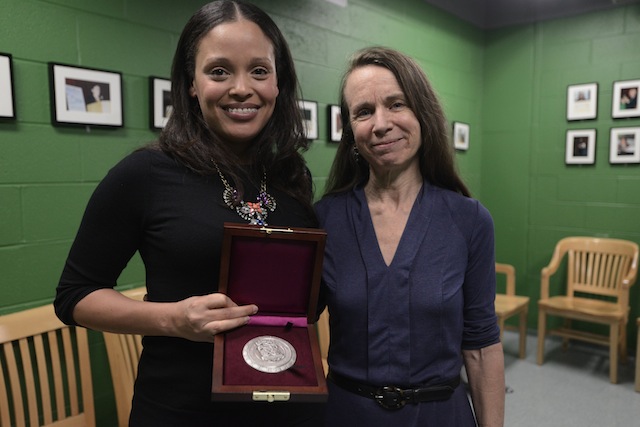Jesmyn Ward Earns The Heartland Prize For Nonfiction For 'The Men We Reaped'
By Jaclyn Bauer in Arts & Entertainment on Nov 4, 2014 10:35PM

Jesmyn Ward and Mary Schmich, photo credit: Paul Beaty / photo for Chicago Tribune
We close out our Chicago Humanities Festival coverage with a recap of Saturday's presentation of the Heartland Prize for Nonfiction to Jesmyn Ward. Ward sat in conversation with Mary Schmich about her prize-winning memoir, The Men We Reaped, and the experiences that led her to write it.
The Men We Reaped is named for a Harriet Tubman quote: “…we heard the rain falling and that was the blood falling; and when we came to get in the crops, it was dead men that we reaped.” Ward’s book focuses on the struggle of black men in the South and all over the world. The Men We Reaped traces the lives of five young black men, all who died within a few years of each other, two of who were relatives of Ward’s, and all of who lived in her hometown of DeLisle, Mississippi.
Ward’s first two books were fiction, and when asked what compelled her to write a memoir, Ward said that even while these traumatic events were happening, she “knew [she’d] have to write about them one day.” While in college at Stanford and later the University of Michigan, Ward explained that she found herself “writing around the experiences” that were going on at home, “but not directly about them.” Even then, her fictional stories often had young black men as their protagonists.
Ward finally decided to write a memoir after several failed attempts at starting a new novel. She felt that something was pulling her away from fiction and compelling her to explore a different medium. She began her writing process by interviewing the friends and family of the five deceased men. This proved a difficult process for numerous reasons, one being that the families of these men wanted (as do most families in similar situations) to remember their loved ones as “saints” and “angels” especially since the men were so young. In order to get at the truth, Ward had to dig into the stories told to her and push the families to tell her the both the good and the bad.
The Men We Reaped is meant not only to be a personal story, but a more encompassing work about what Ward sees happening to black men in the world. She explained that young black men and women are often told “they’re worth less” and this easily becomes internalized. Eventually these same people begin to act and live in ways that confirm this accusation.
Ward’s goal is to break barriers of racial injustice that she still sees as pervasive in the world. She admitted that even though not everyone received The Men We Reaped with the greatest satisfaction, she knew she had to write the book in order to be a part of the larger conversation happening all over the world. Ward stated that “if telling the story can level the playing field and change the conversation” it was worth the risk of telling.